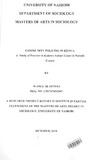| dc.description.abstract | The study sought to establish the community policing practices at Kahawa Sukari Estate in Nairobi. Though the residents are aware of the concept of community policing, the study sought to find out how it is practiced. There were four underlying objectives to guide the study namely: To establish the insecurity experiences of the residents; To find out the awareness levels of the community concept in the community; To find out the participations of residents towards the security; To fmd out government support for community policing. Kahawa Sukari was purposively selected as the research site because it is a vast growing community that has faced numerous challenges of insecurity and other environmental challenges. A total of 87 respondents were drawn which consisted of residents and business owners.
Key informants purposively chosen were 6 in number. Cluster sampling and Simple random sampling technique were used to draw a representative sample of respondents. Questionnaires, which were both open and closed ended and interview guide were the instruments for collecting data. Descriptive statistics were generated to capture the distribution of responses and expressed in percentages. The study found out that a large proportion of residents and business operators have experienced cases of insecurity directly or indirectly. Such cases were largely reported to the police noting that the public recognizes the police as an authority in criminal activities. There was fear the police take very long to react when cases are reported to them, a situation that created lack of confidence. The study also showed that a big number of residents are aware of community policing and thatit entails the public and the police working together. Poor public relation and customer service have kept the public away from reporting issues of insecurity.
The residents participate in welfare association issues and have organized themselves in groups to various reasons among them security. Government support is at its minimal in the community.
The residents are willing to attended forums that would train them on community policing for empowerment and to allow them to adequately take charge of their security by adopting the concept of community policing. There is paramount need to improve the public police relationship to build some confidence. The residents need to attend regular meetings on diverse issues on development of the estate.
The government should come up with strategies that formalize the community policing 'efforts in the estate. Through its appointed agencies, it should be able to train key people in churches, schools and business operations on how they should react to cases of insecurity. Such trained people should then train and empower others to be vigilante and act accordingly. The government should consider including private security as part of community' policing stakeholders. | en_US |

